Physiotherapy is a popular career choice for people who want to make a positive difference to the lives of others. It provides diverse career options and flexibility to move between roles and sectors
Physiotherapists are professionals who work with people to identify and maximise their ability to move and function – an essential part of what it means to be healthy.
Becoming a physiotherapist means you can play a key role in enabling people to improve their health, wellbeing and quality of life.
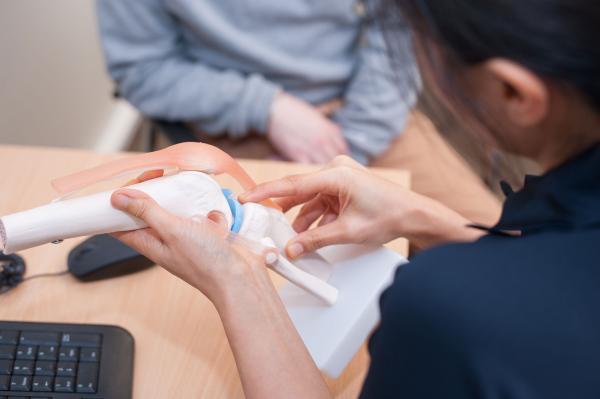
What is physiotherapy?
Physiotherapy encompasses a range of interventions, services and advice aimed at restoring, maintaining, and improving people's function and movement and thereby maximising the quality of their lives.
Physiotherapy is an Allied Health Profession (AHP) along with other roles such as dieticians, occupational therapists and paramedics.
It is a protected profession, and is regulated by the Health and Care Professions Council (HCPC). Only those registered with the HCPC may call themselves physiotherapists and practise physiotherapy autonomously.
What do physiotherapists do?
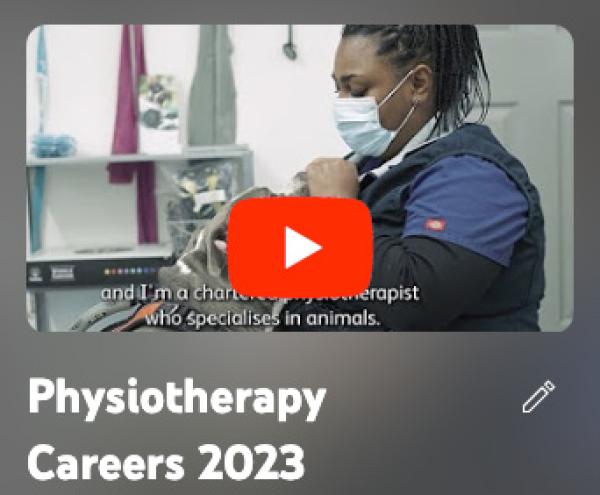
Careers videos
Meet five physios who all do very different jobs – working with children, animals, students, digital projects and people in the community.
Physios undertake many different roles, in a range of sectors and settings including private practice, the NHS, higher education, community and charity sector. They work autonomously but often in multi-disciplinary and integrated teams.
Physios can be involved in all stages of patient care – undertaking assessment, diagnosis, treatment, discharge, referral, rehabilitation, and management of long-term conditions.
The power of physio: Michael Rosen
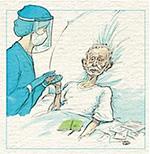
Children's writer Michael Rosen was left in a coma after contracting Covid. He wrote a book about his experiences, including how physios helped him recover.
They work with a variety of age groups and health conditions, and play a key role in promoting and maintaining health, preventing disease, and enabling people to stay in and return to work.
In addition to clinically focused roles, members of the physiotherapy workforce are also educators, researchers, managers and leaders. Some physiotherapists have extended their individual scope of practice to undertake advanced and consultant roles.
Physiotherapists work within the four pillars of practice: clinical, research, leadership, and education.
How much can I earn as a physiotherapist?
The starting salary for a qualified physiotherapist in an entry-level position in the NHS is paid at Band 5. You can earn extra allowances if you work in the London area, where there may also be assistance towards the cost of accommodation.
Salaries in the private sector often vary from those in the NHS.
All full-time allied health professionals (AHPs) employed by the NHS work 37.5 hours a week. The hours are usually during the day between Monday and Friday, but may include a seven-day working pattern. Some weekend and night duty on an on-call basis is usually required and newly qualified staff are not exempt.
The power of physio: long-term conditions

People who are living with chronic health conditions can be helped to live fuller lives after working with physios. Hear stories from three patients.
Where can a career in physiotherapy take me?
If you are looking for an exciting and varied career, physiotherapy could be for you.
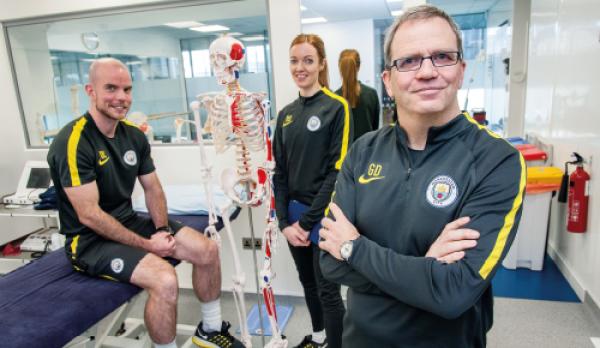
Overall, across the UK, job prospects are good. Physiotherapists can work in different settings after graduation and there are many flexible employment options.
The settings may include:
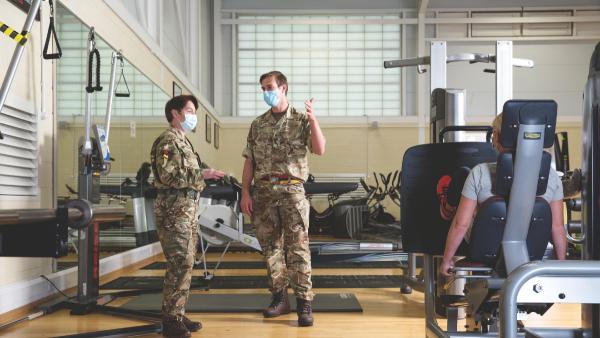
- Private clinics
- Hospitals e.g. orthopaedics, rheumatology, respiratory, neurology, oncology, amputees
- Musculoskeletal outpatients
- GP surgeries/community health centres
- Sports clubs, gyms and leisure facilities
- Occupational health
- Schools
- The armed services
- Charities
- Mental health
- Elderly care e.g. nursing homes
- Nurseries
- Orthopaedics
- Paediatrics
- Women’s health
- Learning disabilities
- Veterinary clinics
About the CSP
The Chartered Society of Physiotherapy (CSP) is the professional, educational and trade union body for the UK's chartered physiotherapists, physiotherapy students and associate members. If you are looking to become a physiotherapist, the CSP is a valuable resource for you to access information, guidance, and support.
CSP services and resources for students
- Professional development opportunities, such as webinars, learning resources and conferences, to help you develop your skills and knowledge as a physiotherapist.
- Access to a network of physiotherapists across the UK who can provide you with valuable opportunities to learn from and connect with other professionals in your field.
- Access to research and publications on physiotherapy, which can help you develop a deeper understanding of the science and theory behind your practice.
- Information on best practices and guidelines in physiotherapy, which can help you stay up-to-date with the latest developments.
- Representation and advocacy for the profession, including lobbying for policy changes that support physiotherapists and their patients. When completing your studies, you can also benefit from trade union services and workplace representation.
One of the most important functions of the CSP is accrediting physiotherapy degree programmes in the UK. Accreditation by the CSP ensures that programmes meet the standards set by the organisation and that graduates are prepared to work as competent and effective physiotherapists. Currently, all physiotherapy pre-registration degree programmes hold our accreditation.
If you are considering a career in physiotherapy, joining the CSP can help you gain valuable insights into the profession and connect with other professionals in your field. Additionally, as a member of the CSP, you can benefit from the organisation's resources and support as you develop your skills and progress in your career.
Other resources
- Health Education England (HEE) universe of opportunities – online resource that outlines eight core areas that you could consider to develop your career, including a range of inspirational AHPs discussing their experience and leadership journeys so far.
- WOW show – videos take you behind the scenes to meet some of the inspirational people who are making a real difference to people’s lives.
- Aspiring allies – this website is built to help you discover more about what AHPs do and offers tools to find the career that best suits you.
- Allied Health Professions (AHP) Careers Awareness Toolkit – useful links to webpages, interactive resources, videos, podcasts, documents and national events.



































